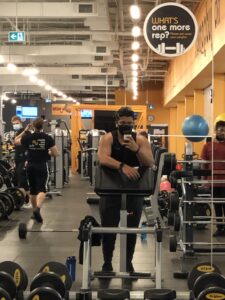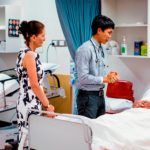
Your Predeparture Checklist: What to expect
After all the countless hours spent on applications, supplementary applications/essays, interviews, the whole 9 yards… it’s all led up to this: Getting ready to leave for Australia!
Take a minute to take it all in!
Okay, wait. Before I get ahead of myself with all these predeparture tips, let me go back for a second and introduce myself.
Hey, everyone, my name is Rahat and I’m an (incoming) first-year medical student at James Cook University in Townsville, Australia. I’m a big city kid (raised in Toronto), enjoy long walks on the beach, vlogging my way through med school on YouTube, and am a big fan of the OzTREKK team.
All jokes aside, this blog post is going to be all about my predeparture process (thus far) and some tips and tricks for you to make the whole process a bit easier for when you’re the one trying to get over to Australia.
Step 1: The Planning Stage
So, as with everything that requires a huge undertaking, it’s always a good idea to start with a plan. The easiest way to go about this when it comes to predeparture prep is to figure out exactly what you can control and what you can’t control—the intangibles if you will:
- Where am I going and what exactly do I need to be able to go there?
- What’s my budget?
- How much space do I have (to pack)/how much space am I going to have when I get there?
- What are some of the things I am going to need/need to do when I get there?
At the time of writing this, COVID-19 is still very much a thing and Australia still has some border restrictions, so some of the things I have had to arrange may not be applicable when you go to Australia. So, keeping that in mind, start to get your travel/administrative documents in order (more details on this in Step 2!).
Where am I going and what exactly do I need to be able to go there?
Think about where you’ll be staying during your time at school for that first year. If you’re staying in university accommodation and have a meal plan, odds are that you won’t need to buy cookware. If you’re staying off campus with roommates, then you might need to pick up some pans and cutlery after you’ve arrived. Also, think about the degree/program you’ll be attending. Is there anything specific you’ll need that your school will not be providing you? Is it easier to get it in Canada or in Australia? For me, it was my stethoscope and some other things for clinical placements.
What’s my budget?
Regardless of how you plan to finance your studies, it’s a good idea to have a budget in mind! Small expenses can add up, so it’s always a good idea to have some way to track your spending. Regarding predeparture stuff, some of the biggest things you’ll need to account for (aside from your tuition) are any fees that you will need for your accommodation, phone plan, and any administrative documents that you may need to provide. More on this in the following sections!
How much space do I have (to pack)/how much space am I going to have when I get there?
What makes this part not so fun is when you realize you can only bring so many things with you the first go around. And that you may not have as much space in Australia as you do at home right now. I think I have packed and unpacked my suitcases/carry-on bags three times each so far. Most airlines give you a weight limit on how much your baggage can weigh. The hard part of packing is figuring out exactly what you can fit, and what you can’t fit in your limited amount of space.
What are some of the things I am going to need/need to do when I get there?
As with a lot of things concerning predeparture prep, the things you’ll have to get sorted are very much dependent on your personal situation; however, there’s also a whole load of things that can apply to everyone, including getting a phone plan and opening a bank account. More on this in Step 3 as well!
Step 2: Getting Your Documents Sorted
When it comes to getting your documents sorted, one of the best resources is OzTREKK! This is because they help you figure out exactly which documents you need for your program. One of the most important documents is your student visa. It’s easier than it may seem—just go to the Australian Immigration Office’s website and apply via their online portal. The portal also outlines the documents you need to get your application approved. The only other major step to your student visa application completion (dependent on your program, of course) is doing a panel physician exam. Basically, you go to one of the specified doctor’s offices and get a check-up done by the doctors there.
Another important part of getting documents sorted is checking to see if anything is required for your program. For example, JCU Medicine has clinical placements in the first year. I’ve had to gather a forms and signatures to ensure that I’m eligible for my placements. If your program has something similar, double-check the placement website or email your placement coordinator. You may not be able to get everything you need for placement/program-specific activities completed right away or all of it done in Canada before you depart, but it’s always good to be ahead on figuring it all out.
Step 3: Figure Out Your Essentials
What you may deem as being essential may be totally different from what someone else in your cohort may deem essential. You’re obviously moving away from home—maybe for the first time—and that is a huge undertaking. Go you! In times like this, it’s also never a bad thing to have some reminders of home in your suitcase.
Think about some of the things you may need over there that you may not be able to get right away once you land. For example, during clinical rotations, I’ll need to adhere to a dress code. I might not have the opportunity to buy new clothes for my clinicals right away, so I’m taking some professional attire with me. The same goes for my stethoscope. I also love photography and vlogging, so packing my camera equipment was essential for me, even if it meant leaving some of my clothes ha ha! (I did try to fit all my sneakers/boots though.)

However, when it comes to things such as cutlery, linens, and things like hairdryers and straighteners/curlers, those are all things that can be purchased easily onshore. Also, be careful when it comes to figuring out which electronics you are taking as they may not be able to handle the voltage that is used in Australia.
Don’t forget: You’re not in this alone and you’ve got your peers. Friends are also essential, even if they aren’t something you can pack up and carry around with you! Talk to them about what they’re taking, and if you can get in touch with upper years in your program, they can give you a good idea of what you actually need versus what you think you’ll need to thrive Down Under.
Step 4: Pack, Unpack, Repack, Repeat
Now for the fun part: fitting everything inside of your bags/suitcases. I’m kidding, this isn’t the fun part. This is probably one of the most stressful parts because no matter how much you pack, you’re probably going to think you’re missing something. Trust me on this. Even though I’ve travelled all over the world and have lived away from home at university before (shoutout to uOttawa!), I have unpacked and repacked all my suitcases, backpack, and carry-on duffel bag multiple times because I keep thinking that I’m missing things.
The best thing you can do is to take your time. This is very Type A of me to say but start early and start with a plan. Remember your essentials that you figured out above and plan around that. Make a checklist. Do what works for you. To quote Top Gun, “Don’t let your ego write cheques your body can’t cash.”
Also, OzTREKK makes a great checklist of what you should consider taking, so keep an eye out for that. But most important, take your time with this and enjoy the process. There’s no reason to be stressed out before you’ve even started your classes. Talk to your friends, talk to your peers, and learn from each other. We’re all in the same boat (or plane) here, so it’s good to build that feeling of camaraderie!
Step 5: Live a Little
Okay, now for the actual fun part—and you can repeat this at any time during this entire process. Remember to just let yourself breathe and live a little bit! You’ve made it, you’re so close to starting this huge adventure! Give yourself a pat on the back and take the time you have now to spend it with your family, friends, pets, loved ones… whomever! If Ol’ Corona has taught us anything within the last two to three years, it’s that you don’t know how much you’ll miss those “normal, everyday” things until you can’t experience them anymore. Remember not having to wear a mask while you’re studying/people watching in coffee shops? Those were good times, but so are the times you’re living in right now!

You’re about to move to the other end of the world, maybe for the first time, and maybe by yourself. It’s definitely a scary feeling, but right now, you’re around your support systems here. Take the time to give yourself a break and relax a little bit before you go full steam ahead at this next undertaking. Okay, that’s enough of me being sappy.
Now then, dear reader of mine, continue onto the next bit for some more crucial info.
Step 6: Don’t Miss Your Flight
This is by far the most important step. If you’re new to flying, welcome to your next big adventure! It’s a lot less nerve-wracking than you’d think!
Here are some quick tips to make your time flying a little bit easier.
Get to the airport early and make sure you check in to your seat on time as different airlines have different procedures. Normally, seat selection for the airplanes opens anywhere between 24 and 72 hours before your departure time. You can also check in online for tons of airlines as well.
Definitely make sure to wear clothes that you’ll be comfortable in as the flight to Australia is usually a long one. When it comes to clothes, just remember that it’s not going to be cold when you land; it will be summer in Australia. Be sure to take a water bottle because hydration during long-haul flights is key! Again, ask others in your cohort how they’re heading over and maybe you can book a flight together. Tell them they can be your wingman anytime (can you tell I love Top Gun?). But seriously, don’t miss your flight!
As of right now, my flights will take more than 50 hours to get there, but that’s because of COVID flight delays and some long layovers—usually its not that long ha ha! If you’re curious about what it’s like flying to Australia, I’ll be documenting that, too! And hopefully, by the next time I’ve written something for all you up and coming OzTREKKers, I’m sitting on a beach in Townsville, getting through this medical degree one day at a time.





































Ask A Question
Ask us about your program of interest, or if you have a question about our services.
CONTACT US TODAY